Colorectal cancer is the second leading cause of cancer deaths worldwide and the third most common type of cancer in developing countries. Fortunately, when detected early, the 5-year survival rate is about 90%.
Below, we asked the Digestive Disease Consultants of Orange County in Orange County, California, to explain how a simple procedure can save your life. Read on to find out when you should screen for colorectal cancer.
What does a colorectal cancer screening look like?
There are multiple ways to screen for colorectal cancer. Your doctor may collect stool samples to look for blood in your stool, or you might undergo a colonoscopy or sigmoidoscopy.
In both procedures, a doctor inserts a thin, tube-like instrument with an attached camera through the rectum to investigate the colon. A sigmoidoscopy only views the S-shaped portion of the colon, so it is less invasive than a colonoscopy.
During the procedures, specialists can examine polyps, which are abnormal growths in your colon. Not all polyps are cancerous, but a polypectomy, or removal of polyps, can prevent benign growths from developing into cancer.
You can also undergo a digital colonoscopy, where specialists use a series of x-rays to examine symptoms such as pain, bleeding, or abnormal bowel movements. A digital colonoscopy is less effective at finding precancerous abnormalities but can diagnose other GI issues.
Who can benefit from more frequent screenings?
Your overall cancer risk increases with age as cells accumulate damage over time. For this reason, you should begin screening for colorectal and other cancers after age 45.
You may benefit from more frequent screenings if you have a family history of colon or rectal cancer, especially if diagnosed before age 50. You also face a higher risk of developing tumors in your colon if you have a family history of cancers near the colon, such as uterine or ovarian cancer.
Apart from direct family history, African Americans and Jewish people of Eastern European descent are most genetically predisposed to colorectal cancer. Other general risk factors include obesity, digestive disorders, and heavy alcohol or tobacco use.
Frequent screenings can also help people with inflammatory bowel disease (IBD), such as ulcerative colitis or Crohn’s disease. If you have one of these conditions, chronic inflammation can cause the cells in your colon to change often, compounding your risk.
To ensure your colon is healthy and stays that way, contact us to schedule an appointment today. Colonoscopies can be uncomfortable, but they are the simplest way to keep you safe.



